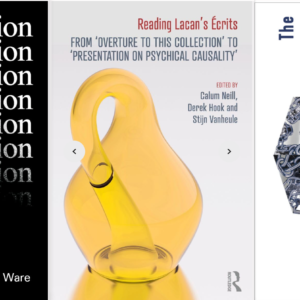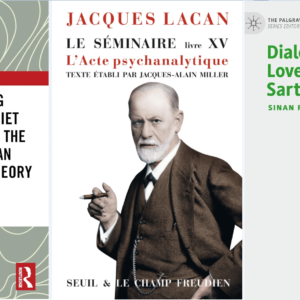News – April 2022
Want to receive this news via email each month? Sign up here.
Richard C. Ledes’ movie Adieu Lacan is now available to watch on demand via streaming services. Starring David Patrick Kelly as Lacan and Ismenia Mendes as his fictional patient, Seriema, it is inspired by the account given by Brazilian psychoanalyst and writer Betty Milan of her analysis with Lacan, and is based on her play Goodbye, Doctor and novel The Parrot and the Doctor. The film has gained positive reviews from viewers, and after screenings at several Lacanian events prior to its general release last month, it is now available on demand. Watch the trailer below, interviews with its stars Kelly and Mendes, and full details on how to see the movie via platforms like Prime Video and Apple TV here. A list of upcoming screenings around the world are also listed.
Out for release next month will be Psychoanalysis, Politics, Oppression and Resistance: Lacanian Perspectives, edited by Chris Vanderwees and Kristen Hennessy. A collection of texts which explore issues of race, culture, and gender through Lacanian psychoanalytic theory and practice, the book covers contemporary issues such as globalisation, Black Lives Matter, and the #MeToo movements. Rather than treating psychoanalysis as detached from progressive ideals, it seeks to engage readers in considering Lacan as a figure who represents, as Badiou and Roudinesco described him, a “weapon of subversion against the current capitalist system.”
Also out next month will be Ben Stoltzfus’ D.H. Lawrence’s Final Fictions: A Lacanian Perspective. Making the argument for a salient convergence between Lawrence’s writings and Lacan’s work, the seven chapters of Stoltzfus’ book encompass seven major fictions that Lawrence wrote between 1925 and 1930, and an analysis of seven major characters within those works. Stoltzfus is professor emeritus of comparative literature, creative writing, and French at the University of California, Riverside.
Coming in July from Routledge will be Baudrillard and Lacanian Psychoanalysis by Victoria Grace. The first book to develop a Baudrillardian critique of Lacanian psychoanalysis, it challenges Lacan’s notion of the ‘real’, his idea that the unconscious is structured like a language, and what Grace sees as the “questionable ethics” of Lacanian psychoanalysis which – using Baudrillard’s terms – she conceives as “an endlessly recursive simulation model.”
Looking further ahead, October promises three new book releases from Routledge, announced in the past month. Movement, Velocity, and Rhythm from a Psychoanalytic Perspective: Variable Speeds, edited by Jessica Datema and Angie Voela, considers bodily rituals, their place in artistic practices, and in philosophical and psychoanalytical theories. Secondly, Asexuality and Freudian-Lacanian Psychoanalysis: Towards a Theory of an Enigma by Kevin Murphy proposes that asexuality is a libidinally-founded desire for no sexual desire, a concept – and a topic – which has been little-theorised to date. Thirdly, Gisele Chaboudez’s What Can We Know About Sex?: A Lacanian Study of Sex and Gender will come courtesy of the Centre for Freudian Analysis and Research Library series, and is translated by Lindsay Watson. It aims to trace how Lacan’s work allows us to make new links between the sexual laws of discourse, gender, and what biology in human life. More on each of these closer to their publication dates. All are available to pre-order now.
Among the papers, Muhammad Zameer Nawaz and Akhtar Aziz’s article ‘Lacking Home: Lacan Reads Diaspora’ for the Journal of Intercultural Studies was published in April. Drawing on Lacan’s understanding of lack, their article presents home as “a constitutive lack of disapora – an extension of the primally lost object of desire – which is installed via the subjectivation process entailing Lacan’s three Oedipal ‘moments of crisis’ namely frustration, privation and castration.” Arguing that lack functions as a spur to creativity, Nawaz and Aziz contend that this enables diaspora to create cultural and social forms resulting in a “painful, yet rewarding acculturation in the hostland.”
Turning to events, this summer in Amsterdam the dormant office will be organizing its first Summer School under the title Virtual Enjoyment. Running 18th–22nd of July it will be led by four renowned thinkers working at the intersection of philosophy, psychoanalysis and cultural theory: Calum Neill, Dominiek Hoens, Isabel Millar, and Samo Tomšič. The school’s program will focus on two of Lacan’s seminars D’un Autre à l’autre and The Other Side of Psychoanalysis, and their relevance to contemporary critiques of (techno)capitalism. Details of how to register (limited to 50 places) via the link above.
The NLS Congress on Fixation and Repetition takes place 2nd-3rd July and registration is now open via the Congress blog. Taking place in Lausanne, Switzerland, there is also the option to attend via Zoom, and simultaneous translations will be provided in English and in French. The full schedule is coming soon here.
Lacan Toronto continues its series of reading groups to study Lacan’s Seminar IV: The Object Relation and Freudian Structures. These will run until the end of July and will be held online, with no charge and no registration necessary. They are open to all those interested in reading Lacan.
Finally, on YouTube check out Jordan Osserman’s discussion of his work on Circumcision and Psychoanalysis, in conversation with Daniel Tutt, as part of the Study Groups on Psychoanalysis and Politics channel. Osserman demonstrates how the practice of circumcision received much greater theoretical interest from the early psychoanalysts than is perhaps remembered today, and he traces Freud’s interest in it: from his comments in the Little Hans case, up to Moses and Monotheism where he considers it the “key fossil” of the subject’s initiation into a community (not just a symbolic substitute for castration). The key opposing theories of Theodor Reik and Bruno Bettelheim on the subject are also discussed. Osserman’s book Circumcision on the Couch The Cultural, Psychological, and Gendered Dimensions of the World’s Oldest Surgery was released at the start of 2022 by Bloomsbury.
Got news? Get in touch.




Leave a Reply